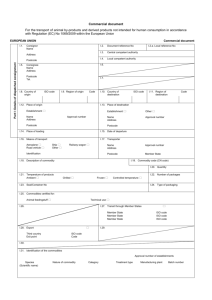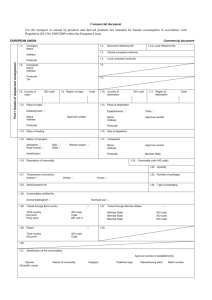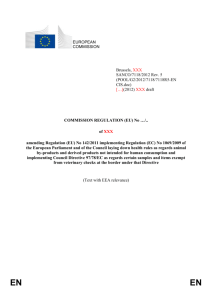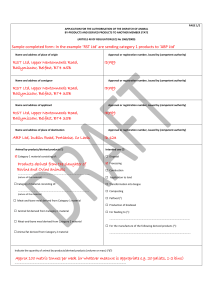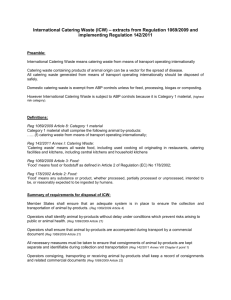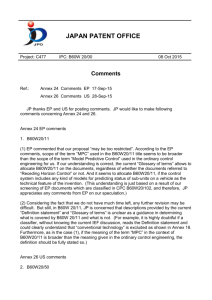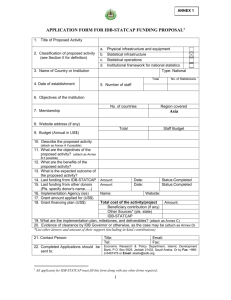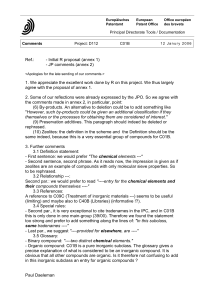7115R1-EN CIS - Association for Organics Recycling
advertisement
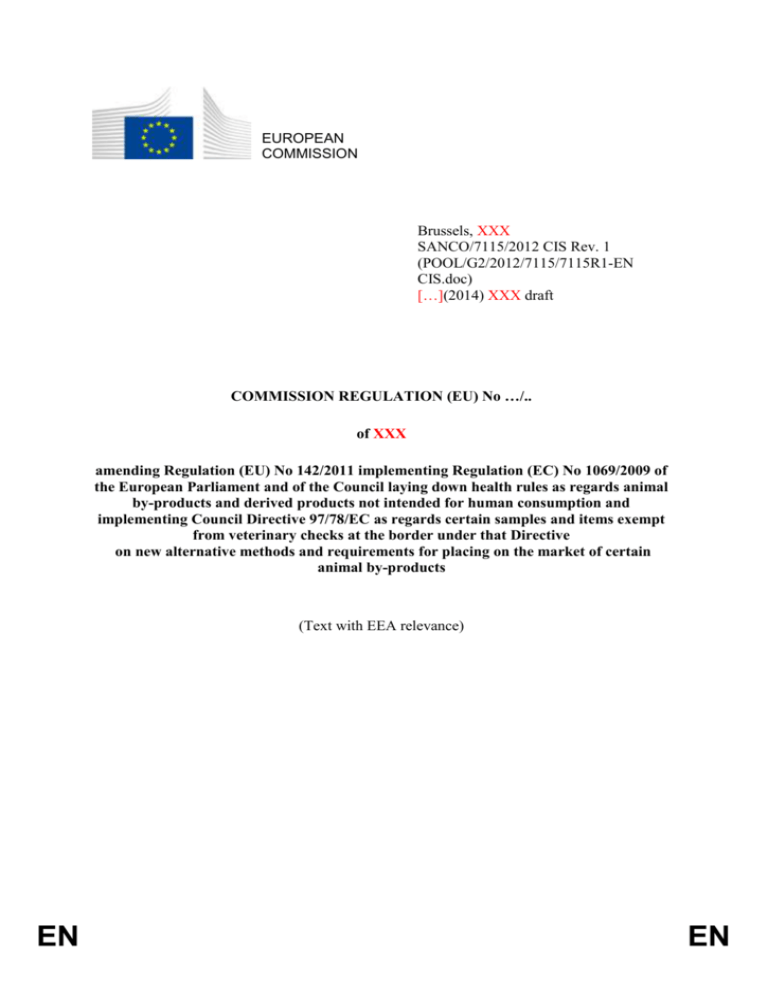
EUROPEAN COMMISSION Brussels, XXX SANCO/7115/2012 CIS Rev. 1 (POOL/G2/2012/7115/7115R1-EN CIS.doc) […](2014) XXX draft COMMISSION REGULATION (EU) No …/.. of XXX amending Regulation (EU) No 142/2011 implementing Regulation (EC) No 1069/2009 of the European Parliament and of the Council laying down health rules as regards animal by-products and derived products not intended for human consumption and implementing Council Directive 97/78/EC as regards certain samples and items exempt from veterinary checks at the border under that Directive on new alternative methods and requirements for placing on the market of certain animal by-products (Text with EEA relevance) EN EN COMMISSION REGULATION (EU) No …/.. of XXX amending Regulation (EU) No 142/2011 implementing Regulation (EC) No 1069/2009 of the European Parliament and of the Council laying down health rules as regards animal by-products and derived products not intended for human consumption and implementing Council Directive 97/78/EC as regards certain samples and items exempt from veterinary checks at the border under that Directive on new alternative methods and requirements for placing on the market of certain animal by-products (Text with EEA relevance) THE EUROPEAN COMMISSION, Having regard to the Treaty on the Functioning of the European Union, Having regard to the Treaty of Accession of Croatia, and in particular Article 3(4) thereof, Having regard to the Act of Accession of Croatia, and in particular Article 50 thereof, Having regard to Regulation (EC) No 1069/2009 of the European Parliament and of the Council of 21 October 2009 laying down health rules as regards animal by-products and derived products not intended for human consumption and repealing Regulation (EC) No 1774/20021, and in particular Article 20(11), Article 21(6)(d) and Article 40(f) thereof, Whereas: (1) Regulation (EC) No 1069/2009 lays down public and animal health rules for animal by-products and derived products, in order to prevent and minimise risks to public and animal health arising from those products. It also provides for the determination of an end point in the manufacturing chain for certain derived products, beyond which they are no longer subject to the requirements of that Regulation. (2) Commission Regulation (EU) No 142/20112, lays down implementing rules for Regulation (EC) No 1069/2009, including rules on the determination of end points for certain derived products. (3) Competent authority may authorise alternative transformation parameters for biogas and composting plants. Biogas and composting plants operating under alternative transformation parameters should be subject to a derogation from certain standards for digestion residues and compost as far as such products can be placed on the market only within the territory of Member States where those parameters have shall be authorised. Article 10 of Regulation (EU) No 142/2011 should be amended accordingly. 1 OJ L 300, 14.11.2009, p. 1. Commission Regulation (EU) No 142/2011 of 25 February 2011 implementing Regulation (EC) No 1069/2009 of the European Parliament and of the Council laying down health rules as regards animal by-products and derived products not intended for human consumption and implementing Council Directive 97/78/EC as regards certain samples and items exempt from veterinary checks at the border under that Directive (OJ L 54, 26.2.2011, p. 1). 2 EN 2 EN EN (4) In accordance with Article 36(3) of Regulation (EU) No 142/2011, for a transitional period until 31 December 2014 and by way of derogation from Article 14 of Regulation (EC) No 1069/2009, Member States may authorise the collection, transport and disposal of Category 3 materials as referred to in Article 10(f) of that Regulation, by means set out in Chapter IV of Annex VI thereto. (5) The Stakeholders association of retail businesses and butchers provided the Commission with evidence on collection and disposal of products of animal origin. Their evidence indicates that the majority of former foodstuffs is collected and processed into feed for farmed animals or used for technical purposes. However, some retail businesses and butchers in territories other than remote areas are authorised by the competent authority to dispose of their Category 3 material referred to in Article 10(f) of Regulation (EC) No 1069/2009 in accordance with the derogation provided for in Article 36(3) of Regulation (EU) No 142/2011. (6) It is justified to authorise such a derogation as a permanent option after the deadline provided for in Article 36(3) of Regulation (EU) No 142/2011, where disposal establishments or plants are so far away that the arrangements necessary for the collection and transport of the small quantities of animal by-products would be unacceptably onerous compared to local disposal. (7) Article 15 of Regulation (EU) No 142/2011, providing special rules on collection and disposal of animal by-products in accordance with Article 19(1) Regulation (EC) No 1069/2009, should be amended accordingly. (8) Several operators and users of organic fertilisers and soil improvers, in particular when they operate outside the food and feed chain, present low risk that organic fertilisers and soil improvers will come into contact with farmed animals. Competent authorities may exempt them from the obligation of registration pursuant to Article 23 Regulation (EC) No 1069/2009. Article 20 of Regulation (EU) No 142/2011 should be amended accordingly. (9) Growing media and potting soil packaging for final consumers with a small content of animal by-product or derived products do not present risk to be used as feed to farmed animals. Therefore such products may be exempted from veterinary controls. Article 22 of Regulation (EU) No 142/2011, which should be amended accordingly. (10) The definitions of intermediate products and trade samples in points 35 and 39 respectively of Annex I to Regulation (EU) No 142/2011 should be clarified with regard to trade in such products and in order to avoid unjustified trade barriers. Annex I to Regulation (EU) No 142/2011 should be amended accordingly. (11) It is established legislation in the European Union that equidae are farmed animals, unless they live in the wild, and moreover they are food producing animals until they are definitely excluded from slaughter for human consumption through an entry in their identification document. There is often an emotional relationship between certain citizens and their horses. It is justified, to take into account the special relationship between humans and horses and to provide horse owners with the possibility of incinerating their dead horses in incinerators approved by competent authority. Annex III to Regulation (EU) No 142/2011 should be amended accordingly. (12) In its Scientific Opinion on Composting and incineration of dead-on-farm pigs3 the European Food Safety Agency (hereinafter EFSA) assessed the risk posed by 3 EFSA Journal 2012;10(2):2559 [11pp.]. 3 EN composting and subsequent incineration of dead-on-farm porcine animals. Composting as referred to in the alternative parameters laid down in Annex V of Regulation (EU) No 142/2011 is not a sufficient treatment for the safe disposal of Category 2 material. All such composted material must therefore be dispatched to an approved incineration or co-incineration plant. Composting and storage of composted material must take place in a closed system under supervision of the competent authority. A derogation laid down in the last subparagraph of Article 23(4) of Regulation (EC) No 1069/2009 is not applicable for the purpose of registration of this alternative processing method. The operator must apply for approval in accordance with Article 24(a) of the above Regulation taking into account specific requirements of this method, and in particular the HACCP system referred to in Article 29 thereof. However, in order to differentiate between the approved methods of composting, and in particular the approval procedure required for composting plants from this method the new method should be called “Aerobic maturation and storage of dead-on-farm pigs with subsequent incineration or co-incineration”. EN (13) With reference to Article 13(g) of Regulation (EC) No 1069/2009 animal by-products originating from aquatic animals of Category 2 material may be ensilied, composted or transformed into biogas without prior processing. (14) In its Scientific Opinion on the evaluation of a new processing method for ABP Category 2 materials of fish origin4, EFSA assessed the inactivation of relevant microbiological hazards of Category 2 materials of fish origin by use of formic acid in conjunction with heat treatment. (15) Following all the steps in the procedure, as described in the EFSA opinion, risks in byproducts from fish would be adequately reduced by the process, and derived products may be used for production of organic fertilisers, composted or transformed into biogas or used for the manufacture of feed for fur animals or other animals not intended for human consumption. (16) In its opinion EFSA referred only to silage of Category 2 materials of fish origin with formic acid. However, the method may be applied also for the processing of fish byproducts of Category 3 materials. (17) Following the successful outcome of a risk assessment, the competent authority may authorise that Formic acid is replaced with any other organic acid if it is demonstrated to that competent authority that the treatment with another organic acid achieves the same reduction of risk related to pathogens present in fish as that achieved by use of formic acid. Annex IV to Regulation (EU) No 142/2011 should be amended accordingly. (18) Digestion residues and compost of animal origin may in practice be mixed with materials of non-animal origin. It is appropriate to label such mixture. Further, it is necessary to indicate to the operator which rules apply for the disposal of such digestion residues and compost. Annex V to Regulation (EU) No 142/2011 should be amended accordingly. (19) The Republic of Croatia notified a list of wild necrophagous birds which should be subject to the derogation on special feeding purposes laid down in Article 18 of Regulation (EC) No 1069/2009. Annex VI to Regulation (EU) No 142/2011, which provides a list of such birds in Member States, should be amended accordingly. 4 EFSA Journal 2011;9(9):2389 [11 pp.]. 4 EN EN (20) Processed animal protein derived from farmed insects may be a valuable source of proteins for feeding of farmed animals, other than ruminants, or for the production of petfood. When farmed insects are grown in a closed system and processed into processed animal protein with processing methods set out in Chapter III of Annex IV to Regulation (EU) No 142/2011, the risk is mitigated to a level which justifies the feeding of insects with Category 3 material referred to in Article 10(f) of Regulation (EC) No 1069/2009 with due respect of the prohibitions laid down by Regulation (EC) No 999/2001. Annex X to Regulation (EU) No 142/2011 should be amended accordingly. (21) Processed manure is according to Regulation (EC) No 1069/2009 a Category 2 derived product. After the entry into force of Commission Regulation (EU) No 749/2011 5 processed manure is no longer subjected to the requirements applicable to the placing on the market of unprocessed manure. Processed manure which has been subjected to a heat treatment of at least 70 C for at least 60 minutes may be placed on the market without advance authorisation referred to in Article 48(1) of Regulation (EC) No 1069/2009. Processed manure shall be accompanied by a commercial document in accordance with the model set out in Annex VIII to Regulation (EU) No 142/2011 authorised by competent authority. (22) All animal by-products and derived products should be dispatched to an approved or registered establishment of destination, unless they have reached their "end point" in the manufacturing chain. Processed manure has not been declared as a product that meets an end point. Therefore, an establishment of destination in intra Union trade with processed manure must be registered or approved or identified when manure would be applied to land. (23) Organic fertilisers and soil improvers may be produced from processed animal protein and from processed Category 3 material referred to in Article 10 of Regulation (EC) No 1069/2009 other than processed animal protein. For the prevention of misuses any such material should be mixed with authorised mixing components in order to exclude the subsequent use for feeding purposes. (24) The requirements for the production and placing on the market of organic fertilisers and soil improvers may be improved to facilitate smooth trade in this area. In addition, the requirements for establishments or plants manufacturing organic fertilisers and soil improvers should be laid down. Annex XI to Regulation (EU) No 142/2011 should be amended accordingly. (25) Imports of bones and bone products (excluding bone meal), horns and horn products (excluding horn meal) and hooves and hoof products (excluding hoof meal) intended for use other than as feed material, organic fertilisers or soil improvers should be authorised also by use of air transport. The import of organic fertilisers which comply with requirements laid down in Article 32 of Regulation (EC) 1069/2009 should be authorised. Annex XIV to Regulation (EU) No 142/2011 should be amended accordingly. (26) Following the amendment of definition of intermediate products, the model of declaration to be used for the import from third countries of intermediate products 5 Commission Regulation (EU) No 749/2011 of 29 July 2011 amending Regulation (EU) No 142/2011 implementing Regulation (EC) No 1069/2009 of the European Parliament and of the Council laying down health rules as regards animal by-products and derived products not intended for human consumption and implementing Council Directive 97/78/EC as regards certain samples and items exempt from veterinary checks at the border under that Directive (OJ L 198, 30.7.2011, p. 3). 5 EN should be modified accordingly. Annex XV to Regulation (EU) No 142/2011 should be amended accordingly. (27) The measures provided for in this Regulation are in accordance with the opinion of the Standing Committee on the Food Chain and Animal Health, and neither the European Parliament nor the Council has opposed them, HAS ADOPTED THIS REGULATION: Article 1 Regulation (EU) No 142/2011 is amended as follows: (1) Article 15 is replaced by the following: "Article 15 Special rules on collection and disposal 1. 2. (2) If the competent authority authorises the disposal of animal by-products by way of the derogation provided for in Article 19(1)(a), (b), (c), (e) and (f) of Regulation (EC) No 1069/2009, the disposal shall comply with the following special rules set out in Chapter III of Annex VI: (a) the special disposal rules for animal by-products set out in Section 1; (b) the rules for the burning and burial of animal by-products in remote areas et out in Section 2; (c) the rules for the burning and burial of bees and apiculture by-products set out in Section 3. By way of derogation from Article 14 of Regulation (EC) No 1069/2009, Member States may authorise the collection, transport and disposal of Category 3 materials as referred to in Article 10(f) of that Regulation by means referred to in Article 19(1)(d) of that Regulation, subject to compliance with the requirements for disposal by other means set out in Chapter IV of Annex VI hereto." In Article 20, paragraph 4, point (d) is replaced by the following: "(d) operators using small quantities of Categories 2 and 3 materials referred to in Articles 9 and 10 of Regulation (EC) No 1069/2009 or of products derived therefrom, for the purpose of direct supply of the products within the region to the final user, on the local market or to local retail establishments, if the competent authority does not consider such activity to present a risk of spreading any serious transmissible disease to humans or animals; this point shall not apply where those materials are used as feed for farmed animals other than fur animals; (3) (e) users of organic fertilisers or soil improvers at premises where farmed animals are not kept; (f) operators exclusively handling and distributing organic fertilisers or soil improvers in "ready to sell" retail packaging of not more than 50 kg in weight." In Article 22, paragraph 2 is replaced by the following: "2. EN The placing on the market of the following is not subject to any animal health conditions: 6 EN (4) (a) guano from wild sea birds, collected in the Union or imported from third countries; (b) "ready to sell" potting soil and growing media with a content of less than 5% in volume of derived products of Category 2 or 3 material. Annexes I, III, IV, V, X, XI, XIV and XV are amended in accordance with the text in the Annex to this Regulation. Article 2 This Regulation shall enter into force on the twentieth day following that of its publication in the Official Journal of the European Union. It shall apply from [Date xx/xx/xxxx – twentieth day after the entry into force of this Regulation]. This Regulation shall be binding in its entirety and directly applicable in all Member States. Done at Brussels, For the Commission The President Jose Manuel BARROSO EN 7 EN

